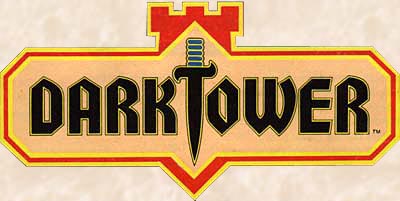|
Dark Tower is a 1981 electronic board game by Milton Bradley Company, for one to four players. The object of the game is to amass an army, collect the three keys to the Tower, and defeat the evil within. The game came out during the height of the role-playing game craze in the early 1980s.
Sounds |
by Milton Bradley
Here
is some amazing news over at Restoration games....Return
to Dark Tower is going to happen! Full game app for your iOS devices Full game app for Android devices - called Droid Tower Play a Flash based version of the game on your computer - Click Here Play a Java based of the game on your computer-Click Here Great website with much info at Well Of Souls
screen shots of the tower screens Dark Tower by Milton Bradley
ComponentsThe game consists of a battery-powered center unit (the Dark Tower), a circular cardboard game board divided into four interlocking quarters (with a hole in the middle for the Tower), four cardboard tokens, several plastic flags, playing pieces, and locations which are placed in convenient holes in the board. In addition, there are several peg boards (with red Battleship-type pegs) used to keep track of a player's number of troops, gold and food. The Tower itself consists of a small membrane keyboard beneath a "display" (a piece of tinted plastic). Behind the display cover is a carousel containing a number of film cells, which, when backlit by one of three lights mounted underneath, display the appropriate picture on the display cover. The display cover also conceals a digital LED display for representing numbers up to 99. As the Tower rotates and illuminates the appropriate cells during gameplay, it also emits sounds for the events represented by each cell. When the Tower is first turned on, it performs a self-diagnostic test. A red zero will appear in the digital display window and quickly disappear, with two flashing red dashes taking its place. Next, after pressing a button on the keypanel, the motor will turn and the two flashing dashes will disappear. Three lighted windows will appear, one by one, from top to bottom. This gives the owner a chance to see if any of the bulbs are burned out. As each window lights up, one will hear a beep and see the number 88 appear in the digital display window (in order to operate all segments of the LEDs). After the three light-up windows appear and disappear with their accompanying beeps and digital displays, a red flashing L1 symbol indicating "Level 1" will appear in the digital display window and remain there. The Tower is then ready for game play. GameplayTo play, each player takes turns rotating the Tower to face them and then moving about the board. The quarter of the board in front of a particular player is his territory. Gameplay proceeds by moving a player's token one space and then pressing a button on the Tower that corresponds to the type of space (e.g., Plains, Tomb, Bazaar, Frontier). The Tower then resolves what happens to the player by showing the player the appropriate cell and reporting whatever occurs. For instance, if the Tower decides that the player has encountered Brigands, it will turn to the Brigands cel, simultaneously displaying the number of brigands encountered. If the player chooses to fight, the Tower resolves the battle by alternately counting off the remaining numbers of friendly troops and Brigands. Once all events have resolved, the Tower is rotated to the next player and their turn begins. Each territory besides a player's own contains one of three keys�bronze, silver and gold, in that order�needed to unlock the Tower. The location of the key is randomly determined by the Tower. Each player will therefore need to travel counter-clockwise around the board, through each of the other three players' territories, until the player has all three keys. At this point, the player returns to his or her territory, buys reinforcements, and then attempts to attack the Tower, which contains a predetermined number of defenders inside. The first player to beat the Tower wins the game; losing requires building up another army. RarityWorking copies of Dark Tower are increasingly difficult to find, and thus highly sought after by collectors. This is primarily due to two things: (1) wear and tear on the tower unit, which tended to experience technical faults with the light bulbs and carousel after prolonged use, and, (2) the fact that the game went out of print shortly after release due to a lawsuit brought against Milton Bradley for intellectual property theft. LitigationDark Tower was the subject of trade secret litigation in 1985. Two independent game developers named Robert Burton and Allen Coleman submitted a game to Milton Bradley entitled "Triumph" that involved an electronic tower as the centerpiece. Milton Bradley rejected the game, but proceeded to released "Dark Tower" some time later. The inventors sued for misappropriation of trade secrets and won a jury verdict for over $700,000. The trial judge, however, vacated the jury's judgement. Despite finding that Milton Bradley had likely "plagiarized the plaintiffs' idea without so much as a by-your-leave" the judge proceeded to issue a directed verdict for the defendant because Burton and Graham had signed a contract waiving any contractual relationship (which arguably included any duty of confidentiality). The First Circuit Court of Appeals reversed, finding evidence that Milton Bradley entered an implied agreement to keep the game confidential and reinstated the damage award.
Return to the WDW attraction main page
|
Videos iPhone/Mobile
PC |
|||||||||||||||||



 The
Dark Tower
The
Dark Tower 
